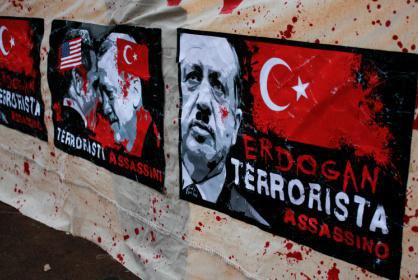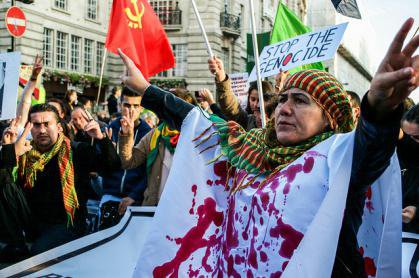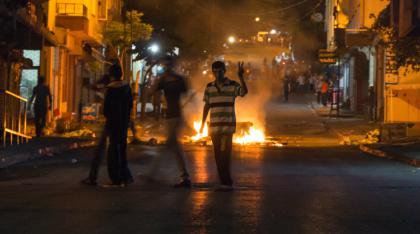
Demonstration against the Turkish president Erdogan. Demotix/Elena Aquila. All rights reserved. The violent attack on a peaceful pro-Kurdish rally in Ankara on 10 October is shocking, heinous and not an anomaly. It is part of a broader historical and contemporary trend: Kurds have long been exposed to different forms and degrees of violence in Turkey and the wider Middle East.
Kurdish experiences of secular-Kemalist and Islamist rule in Turkey show that Kurds cannot rely on the current political framework in Turkey to achieve their political rights. This is because their political voices and claims are widely interpreted as undermining the forces that are assumed to maintain the unity and territorial integrity of Turkey. Kurdish voices – including those expressed in peaceful rallies – are perceived by many to be a direct challenge to ethnic Turks, unsettling their ability to be the spatial managers or governors of the Turkish state and the Turkish nation. Indeed, Turkey’s principle of political organization is best categorized as an ethnocracy: it ethnicizes citizenship and stipulates rights on ethnic bases.
In an ethnocracy, the principle is that a state of and for a particular ethnic identity claims ownership of the state, controls its citizenship and has a monopoly on power. In contrast, the Kurdish movement opposes the national order where ethnic Turks are perceived to be the masters of the state and enjoy the dominant position through determining conditions of belonging to the state, and the distribution of rights and resources. In this sense, recognising Kurdish rights is conceived as making Turkey less Turkish and more Kurdish. This explains why many ethnic Turks are intimated by the word ”Kurdistan”, as our research about the Kurdish diaspora shows.
A major reason behind the recent violence in Turkey is that Kurds experienced a recent political success in Turkey's election in 2015: the pro-Kurdish Peoples' Democratic Party (HDP) prevented President Erdogan from realising his dream of creating an executive presidential system in Turkey, which would have implied taking more power from the parliament. At the same time, although Kurds have been immediate victims of the rise of ISIL in the region, they have also emerged as ISIL’s most potent military adversaries in the Kurdistan Region of Iraq and in Rojava, the predominantly Kurdish regions of Syria.
Indeed, the city of Kobane in that region of Syria has become the symbol of Kurdish resistance in the Middle East, with Kurds gaining increasing international recognition and legitimacy for their resistance. It could be argued that the violence against Kurds in Turkey can precisely be linked to the magnification of the Kurdish voice both nationally and regionally due to these various successes. The Turkish president is well aware that official nationalism often converges with popular nationalism in Turkey and this explains why Turkish nationalist attacks over the past few weeks and months have targeted both the headquarters of the pro-Kurdish HDP and small businesses owned by Kurds. It also partly explains why the violence between Turks and Kurds has now ‘travelled’ (to borrow Edward Said’s term) from the Middle East to Europe, with major clashes taking place between the large Kurdish and Turkish diaspora communities in Germany and Sweden.
Stateless diasporas in the EU

London protest against Ankara bombing. Jonny Dickens/Flickr. Some rights reserved.One of the key matters of contention in Turkey is the assertion that Kurds are determined to divide that country by establishing an independent Kurdish state in the region. Since 2011, our research with Kurds in the UK and Sweden has precisely explored how Kurds in the diaspora view their statelessness and their attachment to a homeland in the Middle East, as part of a broader comparative project on 'Kurdish, Palestinian and Roma Stateless Diasporas in the EU.'
Members of the Kurdish diaspora in the EU are partly a product of the political violence in the Middle East and are often highly involved in the Kurdish struggle. Kurds in the UK and Sweden include individuals, families and communities who migrated or fled to Europe from Turkey, but also from Syria, Iraq, and Iran, and amongst this internally diverse group, a complex question arises: how can Kurds undo the political violence that they have historically been exposed to in the Middle East, a violence that is being repeated to this date?
On the one hand, our research confirms that many Kurds of Iraq, Iran and Syria see federalism and independence as the solution to the long-standing violation of Kurdish rights. In this regard, there is indeed a strong desire for the establishment of an independent Kurdish state in the Middle East. On the other hand, however, Kurdish supporters of the PKK in the diaspora often view nationalism, statehood and capitalism as the very roots of the political inequality that Kurds have historically been (and continue to be) subjected to. As such, our research highlights that many Kurds in the diaspora do not believe that they need more borders (through the establishment of a new state) but more rights. This in turn reflects the views of many members of the Kurdish movement in Turkey who have shown a willingness to abandon nationalism and struggle for the creation of a new inclusive political order where different ethno-political communities can live their differences relationally and non-hierarchically.
Nonetheless, most of our interviewees, whether in favour of, or against either independence or federalism, lamented the fact that Kurds are “a denied people” both in the Middle East and in the diaspora, since their very claim to political existence is assumed to destabilize the Middle East. Stability in that region has historically meant the repression of political, ethnic and religious differences and the assertion of the political status quo, as has been experienced not only by Kurds but also by other groups targeted throughout the so-called Arab Spring. As such, as long as the Kurds continue to be subordinated and subjected to violence and dispossession in the Middle East, the Kurdish movement and its diaspora will remain politically conscious and the political and military struggle will continue in the region with the support of its diaspora.
Viewed as a threat

On the 31st anniversary of the armed struggle of the PKK against Turkey, clashes in Istanbul. Demotix/Willieffen Berger. All rights reserved.Overall, our research indicates that the political conflicts between the Kurdish movement and the Turkish state cannot be limited to and contained within Turkey’s boundaries since this ethnopolitical conflict has a highly transnational dimension that is not bypassing those European countries that are home to large Kurdish and Turkish diasporas. The recent and ongoing clashes taking place between members of the Kurdish and Turkish diasporas in Europe reflect the violent transnationality of this conflict: violence – as oppression and resistance alike – is ‘travelling’ across time and space. While the Kurdish diaspora is viewed by the Turkish diaspora as an extended arm of the PKK, many Kurds, in turn, believe that the Turkish diaspora is the transnational representative and defender of the Turkish state’s oppression of the Kurds.
Whether the recent violence in Turkey leads to a full-scale civil war depends on the ways other major political Turkish parties, and their supporters, react. As long as the conflict is framed by other parties as a conflict between the ruling-AKP and the PKK, civil war remains an unlikely outcome. One thing is particularly evident: anti-Kurdish politics and violence will persist as long as political Kurdish identity is viewed as a threat and not a framework through which Kurds can claim the right to exist and have a normative political and material presence in the Middle East.
Read more
Get our weekly email
Comments
We encourage anyone to comment, please consult the oD commenting guidelines if you have any questions.